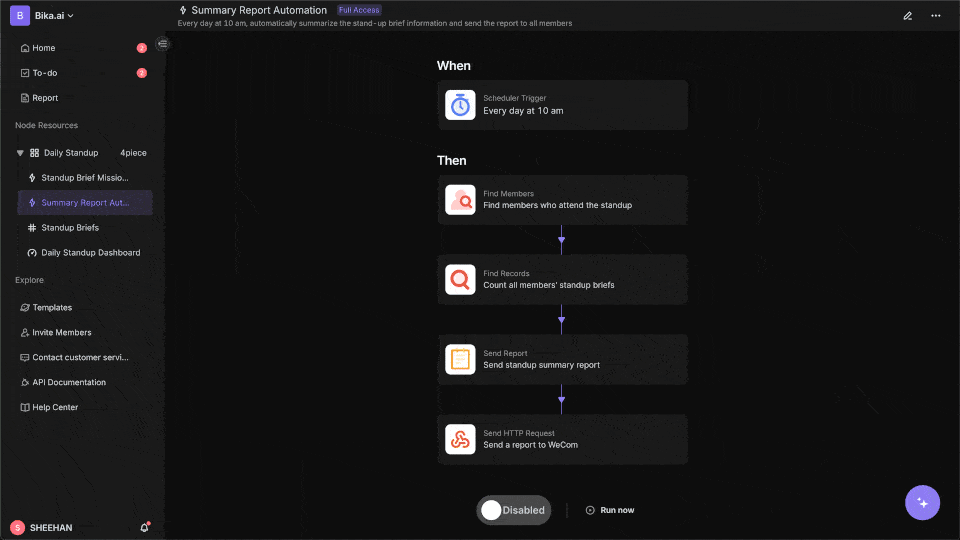
Grow Faster, Work Less: Top Marketing Automation Tools for Startups
Why Marketing Automation is Crucial for Startups in 2025
In 2025, startups are navigating a highly competitive business landscape. With limited budgets and small teams, the pressure to achieve rapid growth is immense. Marketing is a key driver of this growth, but traditional manual marketing processes can be time - consuming and resource - intensive, making it difficult for startups to keep up.
Marketing automation refers to the use of software platforms and technologies to automate repetitive marketing tasks. These tasks can range from email marketing and social media posting to lead scoring and customer segmentation. The core purpose of marketing automation for businesses is to streamline marketing processes, improve efficiency, and deliver more personalized experiences to customers.
For startups, marketing automation tools offer a plethora of benefits. Firstly, efficiency is significantly enhanced. Startups can automate tasks such as sending welcome emails, follow - up messages, and appointment reminders. This not only saves time but also ensures that these tasks are carried out consistently, without the risk of human error.
Secondly, consistent lead nurturing becomes possible. Marketing automation tools for start - ups can track a lead's behavior, such as website visits, email opens, and content downloads. Based on this data, personalized nurturing campaigns can be set up, guiding the lead through the sales funnel towards conversion.
Thirdly, personalized communication is a major advantage. By segmenting customers based on various criteria like demographics, behavior, and purchase history, startups can send targeted messages that resonate with each group. This increases the likelihood of engagement and conversion.
Fourthly, data - driven decisions are enabled. Marketing automation tools collect and analyze data on customer interactions, providing insights into what works and what doesn't. Startups can use this data to optimize their marketing strategies, allocate resources more effectively, and improve their return on investment (ROI).
Finally, scalability is achieved. As startups grow, their marketing needs become more complex. Marketing automation tools can easily scale to accommodate these changes, allowing startups to manage larger customer bases and more extensive marketing campaigns without a proportional increase in resources.
:::: key-takeaways ::::
- Marketing automation boosts efficiency by automating repetitive tasks, saving time and reducing errors for startups.
- It enables consistent lead nurturing through tracking lead behavior and sending personalized campaigns.
- Startups can make data - driven decisions, optimizing strategies and improving ROI with the insights from marketing automation tools. ::::
Top Marketing Automation Tools for Startups
In this section, we present a curated list of leading marketing automation tools suitable for startups. These tools have been selected based on their features, pricing, and overall suitability for early - stage businesses.
Brevo
Brevo is a user - friendly marketing automation platform that offers a wide range of features. It is particularly well - suited for startups looking for an all - in - one solution for email marketing, SMS marketing, and marketing automation.
Core Strengths: Brevo has a simple and intuitive interface, making it easy for non - technical users to get started. It offers a high - volume email sending capability with excellent deliverability rates. The platform also provides real - time analytics, allowing startups to track the performance of their campaigns instantly.
Key Features for Startups:
- Email Marketing: A drag - and - drop email editor makes it easy to create professional - looking emails. It also supports personalized email campaigns based on customer data.
- CRM Integration: Seamlessly integrates with popular CRM systems, enabling startups to manage customer relationships more effectively.
- Pricing Model: Offers a free plan with basic features, making it accessible for startups on a tight budget. Paid plans start at a reasonable price and scale with the growing needs of the business.
Pros/Cons:
- Pros: User - friendly, cost - effective, good deliverability.
- Cons: Some advanced features may require a higher - tier plan.
HubSpot
HubSpot is a comprehensive marketing automation tool that has gained popularity among startups and established businesses alike. It is ideal for startups aiming to build a holistic marketing and sales ecosystem.
Core Strengths: HubSpot offers an integrated suite of tools for marketing, sales, and customer service. This integration allows for seamless data flow between different departments, enabling a more coordinated approach to customer acquisition and retention.
Key Features for Startups:
- Email Marketing: Provides a wide range of email templates and advanced segmentation options.
- Landing Pages: Allows startups to create high - converting landing pages without the need for extensive coding knowledge.
- Lead Scoring: Helps in identifying high - potential leads based on their behavior and interactions with the brand.
- Pricing Model: Has a free CRM, and marketing automation starter plans are relatively affordable, with options to upgrade as the business grows.
Pros/Cons:
- Pros: Comprehensive suite, excellent customer support, and a large community for resources.
- Cons: Can be complex for beginners, and some features may be overkill for very small startups.
Customer.io
Customer.io is a marketing automation tool focused on customer engagement. It is a great fit for startups that want to deliver highly personalized messages to their customers at the right time.
Core Strengths: Customer.io excels in its ability to trigger messages based on specific customer events. This means that startups can send targeted messages when a customer signs up, makes a purchase, or abandons a cart.
Key Features for Startups:
- Event - Driven Messaging: Allows for the creation of automated campaigns based on customer actions.
- Segmentation: Offers detailed segmentation options, enabling startups to target specific customer groups with relevant messages.
- Analytics: Provides in - depth analytics on customer engagement, helping startups understand the effectiveness of their campaigns.
- Pricing Model: Pricing is based on the number of active customers, making it scalable for startups as they grow.
Pros/Cons:
- Pros: Highly focused on customer engagement, easy to set up event - driven campaigns.
- Cons: Limited in some areas compared to more comprehensive platforms, may require some technical knowledge for advanced configurations.
Mailchimp
Mailchimp is a well - known marketing automation tool, especially popular for its email marketing capabilities. It is suitable for startups that are primarily looking to build and grow their email lists and run effective email campaigns.
Core Strengths: Mailchimp has a large user base, which means there are plenty of resources and tutorials available. It offers a simple and straightforward interface for creating and managing email campaigns.
Key Features for Startups:
- Email Marketing: A wide variety of templates, easy - to - use drag - and - drop editor, and A/B testing capabilities.
- Audience Management: Helps startups segment their email lists based on various criteria.
- Pricing Model: Offers a free plan for small lists, and paid plans are relatively affordable, with features scaling as the list size grows.
Pros/Cons:
- Pros: User - friendly, extensive email marketing features, good for beginners.
- Cons: Some advanced marketing automation features may be lacking compared to other platforms.
Essential Features to Look for in Marketing Automation Tools for Your Startup
When choosing marketing automation tools for start - ups, several key features and considerations should be taken into account.
Ease of Use/User Interface: Startups often have limited resources and may not have dedicated marketing technology teams. Therefore, a tool with an intuitive and easy - to - navigate interface is crucial. This allows team members to quickly learn and start using the tool without extensive training.
Pricing/Scalability: Given the budget constraints of startups, pricing is a major factor. Look for tools that offer freemium models or affordable entry - level plans. Additionally, the tool should be scalable, meaning it can grow with the business. As the startup expands, the marketing automation tool should be able to handle increased data volume, more complex campaigns, and a larger customer base without a significant price hike.
Core functionalities:
- Email Marketing: Email remains a powerful marketing channel. The tool should offer features like customizable templates, list segmentation, and automated email sequences.
- Lead Scoring: This helps in prioritizing leads based on their likelihood to convert. By assigning scores to leads based on their behavior, startups can focus their sales efforts more effectively.
- CRM Integration: Integrating with a CRM system allows for better coordination between marketing and sales teams. It ensures that customer data is consistent across both departments, enabling a more seamless customer journey.
- Analytics: Tools should provide detailed analytics on campaign performance, customer engagement, and conversion rates. This data is essential for making informed marketing decisions and optimizing strategies.
Integration capabilities: Startups often use a variety of other tools, such as CRM systems, sales tools, and website builders. The marketing automation tool should be able to integrate with these existing tools to ensure a smooth flow of data and processes.
Customer Support & Resources: In case of any issues or questions, reliable customer support is necessary. Additionally, having access to resources like tutorials, documentation, and a user community can help startups get the most out of the marketing automation tool.
Beyond Standalone Tools: Elevating Marketing Automation with Workflow Integration
While marketing automation tools handle specific tasks efficiently, the real power lies in connecting and automating marketing workflows. Platforms like Bika.ai can take marketing automation to the next level by orchestrating complex, cross - platform campaigns.
Bika.ai enables deeper personalization by integrating data from multiple sources. For example, it can combine customer data from a CRM system with website behavior data to create highly targeted and personalized marketing messages. This seamless data flow between systems, such as from CRM to email and sales to marketing, ensures that the customer journey is consistent and tailored to each individual.
Automated customer journeys are another significant benefit. Bika.ai can map out the entire customer journey, from initial contact to post - purchase follow - up, and automate the relevant marketing actions at each stage. This not only improves operational efficiency but also enhances the customer experience.

Real - World Automation: The Bika.ai Customer Satisfaction Form and Analysis Template for ``
The Customer Satisfaction Form and Analysis Template on Bika.ai is a powerful resource for startups. Its purpose is to provide a comprehensive system for gathering and analyzing customer feedback, which is crucial for enhancing product and service satisfaction.
How it Works:
- Feedback Database: Captures all customer input, including satisfaction ratings, comparisons, reasons, highlights, and a formula to classify customers as promoters or detractors. This serves as the central repository for all customer feedback.
- Themes / Insights Database: Organizes feedback into actionable themes, categorizing them as positive or negative and linking them to related customers. Teams can assign owners, track resolution statuses, and define actions to address issues or capitalize on strengths.
- Feedback Form: Allows customers to easily submit their feedback, ensuring consistent data collection across satisfaction metrics, reasons, and additional comments.
- Follower Database: Stores member information and email addresses of the follow - up team. One person is automatically selected as the follow - up person when new user feedback is received.
- Automation: The "Assign followers when there is new feedback" automation is triggered when a new user feedback form is submitted. It selects a member from the follower database, automatically creates an insight analysis record, and sends an email to notify the member to follow up the analysis.
- Statistics Dashboard: The "Feedback and Satisfaction Statistics" dashboard provides a visual overview of customer satisfaction metrics, including the total number of feedback submissions, product and service satisfaction ratings, and the promoter/detractor breakdown.
Benefits for Startups:
- Centralized Feedback Management: Startups can collect and organize feedback efficiently in one system, eliminating the need for scattered spreadsheets or manual tracking.
- Actionable Insights: By linking customer responses to themes and defining clear actions for improvement, startups can quickly address customer issues and enhance their products or services.
- Automatic Assignments and Reminders: The automatic assignment and email reminder of followers ensure that no feedback goes unaddressed, improving customer satisfaction.
- Visual Analytics: The statistics dashboard gives startups a quick overview of satisfaction levels and trends, enabling data - driven decision - making.
This template enhances the value of any marketing automation tools for start - ups. For example, if a startup is using an email marketing tool from one of the previously mentioned platforms, the feedback collected through the Bika.ai template can be used to segment customers further. Customers who are dissatisfied can be targeted with personalized emails offering solutions or incentives, while promoters can be engaged with loyalty - building campaigns.
Try the Customer Satisfaction Form and Analysis Template
Conclusion: Powering Your Startup's Growth with Smart Automation
Marketing automation tools are a game - changer for startups in 2025. They offer a cost - effective and efficient way to engage leads, nurture customers, and drive growth. By choosing the right marketing automation tools, startups can streamline their marketing processes, make data - driven decisions, and deliver personalized experiences to their customers.
However, the real potential is unleashed when these tools are integrated with platforms like Bika.ai. Bika.ai enables startups to create intelligent, automated workflows that enhance the capabilities of their marketing automation tools.
We encourage startups to explore Bika.ai to build custom automations and achieve unprecedented marketing efficiency.

FAQ
Q: How can marketing automation tools help startups with limited budgets? A: Marketing automation tools can automate repetitive tasks, reducing the need for additional staff. Many also offer free or low - cost plans, like Brevo's free plan and Mailchimp's free option for small lists. This allows startups to achieve more with less, improving efficiency and potentially increasing ROI without a large upfront investment.
Q: Why is integration with other tools important for marketing automation in startups? A: Startups use various tools for different aspects of their business. Integration ensures seamless data flow between marketing automation tools, CRM systems, sales tools, and website builders. This enables a more coordinated approach to customer acquisition and retention. For example, data from a CRM can be used to personalize email marketing campaigns created with a marketing automation tool.
Q: How does the Bika.ai Customer Satisfaction Form and Analysis template enhance marketing automation for startups?
A: The template provides a structured way to collect and analyze customer feedback. This feedback can be used to segment customers further in marketing automation tools. It also automates the follow - up process, ensuring that customer issues are addressed promptly. By integrating this template with existing marketing automation tools, startups can create more targeted and effective marketing campaigns based on real - time customer feedback.

Recommend Reading
- Top RSS Reader Picks for 2025: Your Guide to Smarter Content Curation & Advanced Automation
- Top RSS Reader Picks for 2025: Your Guide to Smarter Content Curation & Advanced Automation
- Choosing the Right AI Content Detector: A 2025 Comparison of Top Tools
- Elevate Your Presentations: Best Presentation Software Alternatives to PowerPoint in 2025
- Elevate Your Presentations: Best Presentation Software Alternatives to PowerPoint in 2025
Recommend AI Automation Templates





Coming soon



